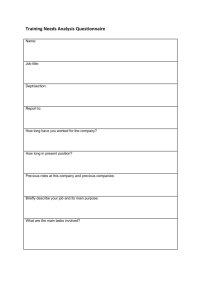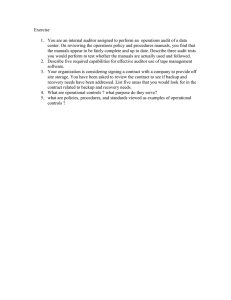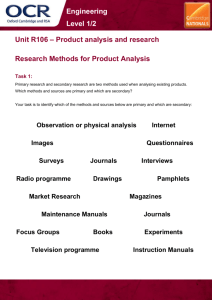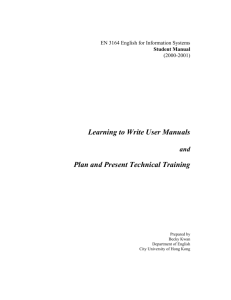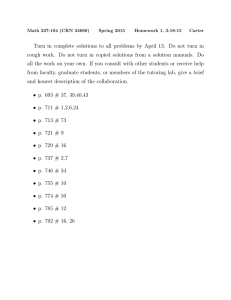Right To Play Program Manuals: Learning Through Sport
advertisement
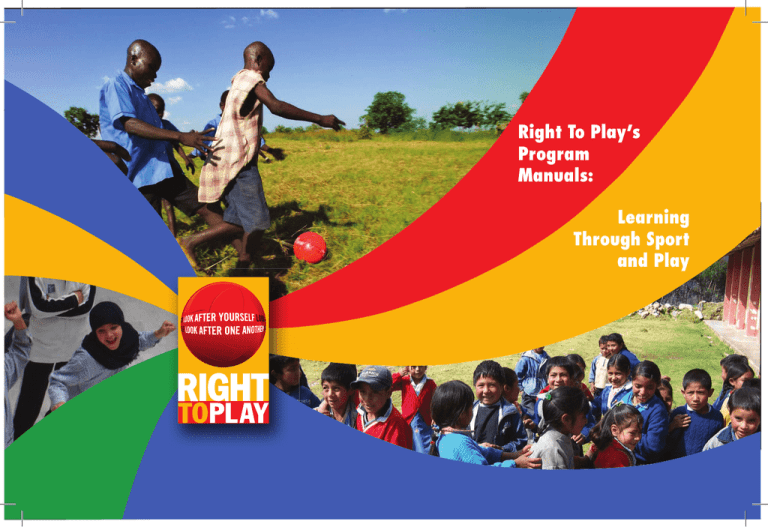
Right To Play’s Program Manuals: Learning Through Sport and Play is the leading international humanitarian and development organization using the transformative power of sport and play to build essential skills in children and thereby drive social change in communities affected by war, poverty and disease. Right To Play creates a safe place for children to learn and fosters the hope that is essential for children to envision and realize a better future. The United Nations Convention on the Rights of the Child guides our work. Right To Play programs target the most marginalized individuals including girls, persons with disabilities, children affected by HIV and AIDS, street children, former child combatants and refugees. RESOURCE MANUALS support the implementation of Right To Play programs and are designed in consultation with experts and educators, communities, parents and children Guiding Principles for the design of the resource manuals include an experiential approach to learning, Right To Play’s Reflect-Connect-Apply methodology, and the inclusion of all children regardless of gender, religion, ability, ethnicity, or socio-economic status. Manuals are used for workshop facilitation, play-based learning activities, addressing community needs, and promoting healthy, physical, cognitive, emotional and social development. Manuals are used by volunteer community Leaders, Coaches, teachers, and Right To Play staff to facilitate capacity building workshops, implement play-based learning activities, address community needs, and promote healthy physical, cognitive, emotional and social development. Manuals are selected based on expressed community interests; local Coaches and teachers select relevant games and activities. Manuals are implemented by Leaders in a range of settings, including urban, rural, formal school systems, and informal community-based education settings. For example, in HIV and AIDS prevalent regions, Leaders are trained with the Live Safe Play Safe resource, aimed at teaching children how to reduce stigma in their communities and protect themselves against the transmission of HIV. Programs are delivered in partnership with other development actors including non-governmental organizations, Ministries of Education, and UN agencies, to ensure success and sustainability. In post-conflict settings and refugee camps, Leaders are trained to deliver activities from the Team Up resource, which seeks to engage children and youth in peace-building activities that promote non-violence and understanding. RESOURCE COMPONENTS for core programs are comprised of a Trainer Manual, a Leader Manual and a Games Manual Trainer Manuals help design, deliver and evaluate workshops, and ensure that Leaders responsibly deliver activities in safe and joyful settings. Games Manuals contain the play-based learning activities, as well as other planning and implementation tools in support of program delivery. Leader Manuals act as textbooks for training workshops, and help Leaders plan, implement and assess play-based learning activities. A number of other manuals are available that support various partnerships, initiatives and capacity building outcomes. Resources are Basic Education & Child Development Conflict Resolution & Peace Building organized under Right To Play’s four development impact areas: Health Promotion & Disease Prevention Community Development & Participation Red Ball Child Play BASIC EDUCATION & CHILD DEVELOPMENT Nine Manuals >> RED BALL CHILD PLAY Focus: Holistic Child Development Target: Ages 6 - 12 Red Ball Child Play Early Child Play Holistic Child Development through the Early Years Holistic Child Development, Ages 6-12 Integrated Learning Health & Physical Education Curriculum Learning To Play, Playing To Learn Abilities First Sport Specific Leader Manual PART 2: GAMES Red Ball Child Play promotes intellectual, physical, emotional, and social development in children by focusing on the healthy development of the whole child. Play-based activities outlined in this resource help to teach children about the value of making healthy choices, building satisfying relationships, and contributing positively to their community. The lessons centre around five coloured balls, each ball representing one of five areas of development imperative for healthy growth: red for mind, black for body, yellow for spirit, blue for peace, and green for health. This resource contains more than 150 play-based activities. Related Manuals: Trainer Manual (Required 2034 Hour Workshop), Leader Manual Part 1: Introduction, and Leader Manual Part 2: Games Languages: Amharic, Arabic, Bambara, Brazilizn Portugese, English, French, Indonesian, Karen, Kinyarwanda, Mandarin, Spanish, Swahili, Thai, Urdu BASIC EDUCATION & CHILD DEVELOPMENT Early Child Play EARLY CHILD PLAY Leader Manual PART 2: GAMES Focus: Holistic Early Childhood Development Target: Ages 2 - 3 and 4 - 5 Early Child Play promotes fun, play and effective learning for children, ages 2 to 5. The resource includes more than 65 play-based activities that promote the holistic development of young children, using parallel and co-operative play. Parallel play refers to individual play activities for 2, 3 and some 4-year-olds. Co-operative play involves simple, group activities for some 4 and most 5-year-olds. The program emphasizes building confidence, physical dexterity, and co-operation skills. Children in disadvantaged situations face many barriers to healthy development. Play-based activities can help to break down these barriers by increasing trust, providing joy, decreasing feelings of loneliness, and decreasing fear and uncertainty. This resource uses the same five coloured balls and areas of development as Red Ball Child Play. Related Manuals: Trainer Manual (Required 20-34 Hour Workshop), Leader Manual Part 1: Introduction, Leader Manual Part 2: Games Languages: Arabic, Bambara, English, French, Indonesian, Karen, Mandarin, Spanish, Thai BASIC EDUCATION & CHILD DEVELOPMENT Holistic Child Development through the Early Years Holistic Child Development, Ages 6-12 Focus: Holistic Early Child Development Target: Ages 2 - 3 and 4 - 5 Focus: Holistic Child Development Target: Ages 6 - 12 Holistic Child Development through the Early Years is a reference guide and resource for Trainers who plan, lead, and assess Early Child Play workshops for Leaders working with young children. The resource includes valuable information about healthy brain development, the importance of play, and principles of child development. Also included is an assessment tool for use at the Leader level for measuring the success of the Early Child Play program. The assessments cover areas of physical well being, language and cognitive skills, emotional development, and social development. Holistic Child Development Ages 6 - 12 is a reference guide and resource to help Trainers increase their knowledge about child development and how children learn. The information in the resource enhances the Trainer’s knowledge and skills for planning and leading workshops for Leaders, and observing and supporting Leaders as they plan and lead sessions for children. The resource will also assist Trainers when discussing the benefits of Right To Play resources and programs with potential partners. The information provided in the manual serves as a self-assessment tool to determine if current practices are adaptable to children’s ages and stages of development and to maximize each child’s learning. Languages: English, French, Spanish Languages: English, French BASIC EDUCATION & CHILD DEVELOPMENT Page 1 Integrated Learning Health & Physical Education Curriculum RIGHT TO PLAY Health and Physical Education Curriculum Focus: Teachers working with children ages 2 - 12 Target: Ages 2 - 12 Focus: Holistic Child Development Target: Ages 6 - 12 2008 The Integrated Learning Teacher and Trainer Manuals are designed to assist teachers already trained in Early Child Play and/or Red Ball Child Play. The workshop and accompanying manuals inform teachers on how to integrate play-based activities into their regular classroom setting in order to achieve curriculum objectives and create a child-centered, participatory learning environment. The Teacher Manual includes a general introduction on changing beliefs about teaching and learning with an emphasis on the child-centered classroom. This is followed by age specific sections that offer practical suggestions and strategies for implementing an integrated approach to teaching and learning. The questions addressed include how to use each game to integrate multiple key learnings, how to modify a game to integrate a curriculum requirement, how to integrate language and mathematics activities into the playing of a game, and finally, how to extend a game using integrated activities after the game has been played. Related Manuals: Trainer Manual (Required 28-30 Hour Workshop), Teacher Manual Language: English Health and Physical Education Curriculum establishes the foundation for teachers to plan meaningful educational experiences for students to acquire the knowledge, skills, and attitudes necessary to lead an active, healthy lifestyle. It provides students with the knowledge and skills to become involved in sport outside of school. The curriculum is divided into four parts: Healthy Living, Active Participation, Movement Skills, and Game Strategies. Each section is subdivided by age, outlining the overall and specific objectives to be taught. Accompanying lessons provide the teacher with in-depth instructions and ideas to support the curriculum objectives. 65 QUEEN STREET WEST, THOMSON BUILDING, SUITE 1900, BOX 64, TORONTO, ONTARIO, M5H 2M5 CANADA Related Manuals: Health & Physical Education Curriculum, Lessons Languages: Arabic, English BASIC EDUCATION & CHILD DEVELOPMENT Learning To Play, Playing To Learn Abilities First www Focus: Holistic Child Development Target: Ages 8 - 12 Focus: Inclusion of Children Living with Disabilities Target: Ages 5 - 18 Learning to Play, Playing to Learn is a Canadian school resource for social studies, literacy, and physical education created by Olympian Silken Laumann in partnership with Right To Play. Lessons are based on Red Ball Child Play’s five coloured balls to represent the healthy development of children. Activities feature an exploration of children around the world, the countries in which they live, and how play and sport helps us all live fuller and happier lives. Post-game discussions encourage students to reflect upon their rights and responsibilities in the global community. The Playbook includes: a curriculum matrix, 30 ways to start your day with Right To Play (10 – 20 minute classroom-friendly heart starter activities), 16 stand-alone lesson plans with student worksheets based on 11 different countries, and an evaluation rubric. The final section describes ways to get involved with Right To Play’s important work and profiles four of Right To Play’s Athlete Ambassadors. Tools: Classroom poster with world map, CD including: Case of the Missing Red Balls mystery story, Country Fast Facts, Extension activities, Photographs, Right To Play Introduction Video, Learning To Play, Playing To Learn Introductory Slide Show, and Learning To Play, Playing to Learn Resource in PDF format Related Manuals: The Playbook (50 page resource with activities and worksheets) Languages: English, German This companion manual is designed to provide more information and support to Right To Play Leaders who are helping to promote the inclusion of children with disabilities in Right To Play activities. The resource is meant to complement, not replace, other program manuals such as Red Ball Child Play. The Abilities First resource builds on the philosophy, principles, suggestions and ideas of all Right To Play Leader Manuals and the Right To Play training workshops for Leaders. It emphasizes the commitment of Right To Play to all children to have the opportunity to play and learn together. The manual aims to increase understanding of disabilities and strategies to modify lessons to successfully include all participants. Related Manuals: Abilities First Trainer Manual (Required 24-27 Hour Workshop), Abilities First Leader Manual, Abilities First Fact Sheet Languages: Amharic, Brazilian Portugese, Classic Arabic, English, French, Swahili BASIC EDUCATION & CHILD DEVELOPMENT Sport Specific SPORT-SPECIFIC: BASKETBALL SPORT-SPECIFIC: FOOTBALL FOR DEVELOPMENT COACHING MANUAL SPORT-SPECIFIC: VOLLEYBALL FOR DEVELOPMENT COACHING MANUAL FOR DEVELOPMENT COACHING MANUAL Focus: Life Skills and Character Development Target: Ages 6 - 18 The Sport Specific Manuals ensure that Leaders facilitating traditional sports, such as football (soccer), basketball and volleyball, create a positive environment where participants focus on team work and fair play, while building skills, character, and confidence. All Right To Play sport specific programs share some common aims, such as high levels of participation and the development of sport skills. At the same time, the goal is to empower individuals and communities. A successful program will implement an organized sport program for children and youth that promotes personal and community development. The Coaching Manual introduces the principles of coaching for development, supports session planning, describes the history and rules of the sport, and provides a description of all related activities. Related Manuals: Sport Specific Trainer Manual (Required 28-42 Hour Workshop), Football for Development Coaching Manual, Basketball for Development Coaching Manual, Volleyball for Development Coaching Manual, and Discussion Guide for Coaches. Languages: English (Football For Development and Sport Specific Trainer Manual available in French) BASIC EDUCATION & CHILD DEVELOPMENT Team Up CONFLICT RESOLUTION & PEACE BUILDING One Manual >> Focus: Conflict Prevention and Peace Building Target: Ages 6 - 18 Team Up Team Up was developed in response to the need for a program that could leverage the power of sport and play to promote peace within and among communities around the world. The resource aims to promote social integration and solidarity in communities, provide non-violent means for preventing and/or resolving conflict, and address the vulnerability of children in armed conflict areas. The accompanying Games Manual includes more than 100 play-based activities designed to engage children and youth in peace-building learning experiences. The manual is divided into three sections: Understanding Self, Understanding Others, and Building Communities. The resource additionally seeks to develop future Leaders who are positive role models and who can contribute to building peaceful communities grounded in human rights and principles of social justice. CONFLICT RESOLUTION & Related Manuals: Team Up Trainer manual PEACE (Required 22-24 Hour Workshop), BUILDING Team Up Leader manual, Team Up Games manual Language: English T E AM U P l e a d e r m a n u a l Live Safe Play Safe HEALTH PROMOTION & DISEASE PREVENTION Three Manuals >> Focus: HIV and AIDS Education and Prevention Target: Ages 6 - 19 Live Safe Play Safe Deworm the World Health Games Live Safe Play Safe contributes to the prevention of HIV and AIDS by engaging children and youth in sport and play activities that teach them about healthy lifestyle behaviours. The manual is based on the principles of health promotion and behaviour change theory followed by the UN and the World Health Organization. Play-based activities reduce the stigma surrounding HIV and AIDS, build knowledge around the associated risks, and promote life skills needed to adopt and maintain healthy behaviours. The activities in the Games Manual promote respect for self and others, inclusion, and co-operation. Live Safe Play Safe sessions encourage behaviour change by repeating key messages throughout the program and providing opportunities to practice new skills, such as negotiating and being assertive. The resource materials include guidelines for age-appropriate activities and discussions. HEALTH PROMOTION Related Manuals: Trainer Manual (Required 32-85 & DISEASE Hour Workshop), Leader Manual, Games PREVENTION Manual, Facts & Questions Guide Languages: Amharic, Classic Arabic, English, French, Swahili; FAQs in Kinyarwanda DEWORM THE WORLD INITIATIVE Deworm the World Health Games Focus: Disease Prevention Target: Ages 5 - 18 Focus: Disease Prevention Target: Ages 5 - 18 Games Manual in partnership with The Deworm the World manual, used in collaboration with the Play Day Planning Guide and Toolkit, will help children gain awareness about worm infections and their negative effects; how children get worms and signs of worm infections; how to avoid infections and how to treat them. The resource was developed in response to the 400 million school-age children that are currently infected with parasitic worms worldwide. Chronic infections have a serious detrimental impact on education. Sick children have high absenteeism rates and when they are present at school they have difficulty concentrating or are too tired to learn. This resource can complement a Play Day (See the Play Day description for more information) focused on this particular health issue. Related Manuals: Deworm the World Play Day Toolkit, Deworm the World Games Manual Languages: English, Mandarin The Health Games resource contains more than 50 play-based activities to teach children basic information about preventable diseases, including: malaria, measles, polio, tuberculosis, diarrhea, influenza, mumps, dengue fever, chickenpox, tetanus, rubella; and how the diseases are transmitted, detected, prevented, and treated. Health Games are often local traditional games that volunteers have adapted to include a health message. The Health Games Manual has been created to assist Red Ball Child Play Leaders in delivering simple health messages to children through their participation in the activities and a discussion of key learning outcomes afterwards. This can also complement a Play Day focusing on local health issues. Related Manuals: Health Games: Awareness, Prevention and Protection Languages: English, Mandarin, Spanish HEALTH PROMOTION & DISEASE PREVENTION Youth As Leader COMMUNITY DEVELOPMENT & PARTICIPATION Four Manuals >> YOUTH AS LEADER facilitator manual Focus: Participatory Leadership Target: Ages 13 - 20 + Youth As Leader Play Day: Planning Guide & Toolkit Gender Sensitivity Manual Guide to Being an Effective Adult Facilitator Youth As Leader aims to engage youth in meaningful experiences to develop a sense of efficacy, pride, and confidence. The facilitator manual is used by adults to create a four-to-eight day workshop for youth in the community to promote leadership skills and positive attitudes. Participants take ownership to develop their own community event or initiative and lead the project through each of its stages - including planning, implementation, and evaluation. Through the application of this workshop, youth receive practical leadership experience in their community. Related Manuals: Facilitator Manual (Required 25-30 Hour Workshop) and Workbook Languages: Arabic, English, French, Spanish COMMUNITY DEVELOPMENT & PARTICIPATION Play Day: Planning Guide & Toolkit Gender Sensitivity Manual Play Day Focus: Play Day Planning & Follow-Up Target: Trainers The Play Day: Planning Guide and Toolkit provides guidance for planning, facilitating, monitoring, assessing, and reporting on Play Days. A Play Day is an event where Right To Play games are used to mobilize a community around a particular issue. National Immunization Days, World AIDS Day and other thematic days, as promoted by the United Nations and/or national governments, are opportunities to build on media reporting about issues that affect communities. In addition to essential background information for planning Play Days, the toolkit also provides sample checklists, financial forms, report and requisition forms, and templates. Related Manuals: Play Day: Planning Guide & Toolkit (Deworm the World and Health Games can be used as complementary resources) Languages: English, French Focus: Gender sensitivity and inclusion of girls and women in programs Target: Leaders and Staff Guide to Being an Effective Adult Facilitator GENDER sensitivity manual This manual is designed to challenge Right To Play Leaders and staff to examine their work and lives through a gender lens. Through specially-designed training sessions the Gender Sensitvity Manual asks participants to explore internal and external ideas of gender in order to increase understanding of gender issues and develop strategies to overcome barriers to gender equity. This includes practical strategies for increasing the inclusion of girls and women in Right To Play’s programs. The Gender Sensitivity Manual builds on the philosophy, principles, suggestions and ideas of all Right To Play Leader manuals and the Right To Play training workshops for Leaders. Related Manuals: Gender Sensitivity Trainer Manual (Required Workshop), Gender Sensitivity Leader Manual Languages: English, French to be available in January 2011 Right To Play Trainer: A Guide to Being an Effective Adult Facilitator Focus: Adult Education Target: Trainers Created by This resource complements all Trainer Manuals as a source of information and tips specific to facilitating workshops for adults. Right To Play views adult education as a tool for individuals to gain new awareness through experience and guided discussions. Building on existing knowledge, skills, and experience, adult education can help Leaders, Coaches, and Trainers make positive changes in the lives of children around the world. Topics include: being an effective facilitator, managing challenging adult behaviours, and techniques and activities that promote participation. Related Manuals: A Guide to Being an Effective Adult Facilitator Languages: Arabic, French, Indonesian, Mandarin COMMUNITY DEVELOPMENT & PARTICIPATION Refresher and Advanced Workshops For Leaders ADDITIONAL SUPPORT RESOURCES Three Manuals >> Focus: Training Design and Delivery Target: Trainers Refresher and Advanced Workshops For Leaders RCA Advanced Training Session Reviewing the Effects of Earthquakes on Children Refresher and Advanced Workshops For Leaders helps Trainers plan, lead, and assess workshops to refresh and update Leaders’ knowledge and skills with regards to program implementation. The guide includes tips for planning refresher and advanced workshops as well as tools for assessing the quality of newly developed training sessions. Advanced workshops are trainings designed for Leaders who have already mastered the skills taught in their original or most recent workshop. These workshops provide new and advanced information for Leaders to challenge their thinking and expand their skills, knowledge and further develop their attitudes. Refresher workshops are trainings that help Leaders remember and refresh their minds on the key learnings of their original or most recent workshop. These workshops often include ADDITIONAL opportunities for Leaders to both learn new games and SUPPORT to practice leading games in an environment where RESOURCES they feel safe giving and receiving feedback. Related Manuals: Refresher and Advanced Workshops For Leaders Language: English RCA Advanced Training Session Focus: Skill Building Target: Trainers and Leaders The RCA Advanced Training Session helps Leaders and Trainers deepen their understanding of the Reflect-Connect-Apply methodology. This resource can be used to help plan and lead an advanced refresher workshop for Leaders who want to improve and build upon their opening and closing discussion skills. Leading effective opening and closing discussions during Right To Play activity sessions is a challenging and essential part of helping children learn the key messages of Right To Play resources. The manual includes a detailed description of a two-day workshop filled with interactive activities that help Leaders and Trainers build their skills in leading effective discussions and promoting lasting behaviour changes. Related Manuals: RCA Advanced Training Session Language: English Reviewing the Effects of Earthquakes on Children Focus: Resiliency Target: Leaders working with children affected by natural disasters Reviewing the Effects of Earthquakes on Children includes a Trainer and Leader resource originally designed for Leaders working with children affected by earthquakes. The three-to-four hour workshop helps Leaders increase their understanding of common reactions children have to earthquakes and loss, and to become familiar with well-researched strategies for supporting children as they recover from the effects of an earthquake. The resource can be easily adapted for locations where children have been affected by a variety of natural disasters. Related Manuals: Reviewing the Effects of Earthquakes on Children Languages: English, Mandarin ADDITIONAL SUPPORT RESOURCES For further information, please contact: Heather Auden Right To Play International © 2010 Right To Play TEL +1 416 498 1922 ext. 251 Design by carlamanya.com EMAIL hauden@righttoplay.com Printed by WEB www.righttoplay.com
